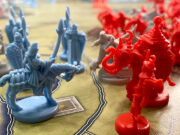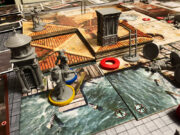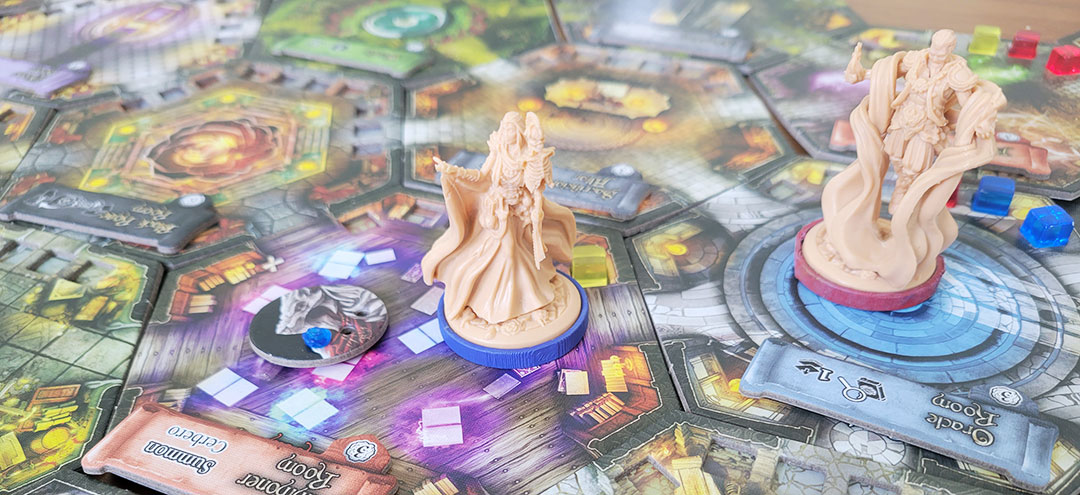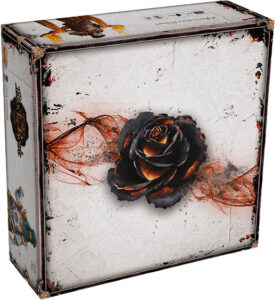 Welcome to the Black Rose Order. A mysterious and magical place where mages battle to become the Supreme Magister and get that sweet, sweet forgotten magic all for themselves. Spells will be cast, evocations will be summoned, and the Black Rose will grant rewards and punishments on a whim.
Welcome to the Black Rose Order. A mysterious and magical place where mages battle to become the Supreme Magister and get that sweet, sweet forgotten magic all for themselves. Spells will be cast, evocations will be summoned, and the Black Rose will grant rewards and punishments on a whim.
Black Rose Wars is a deck-building and action programming game for 1-4 players. The game takes 2 to 3+ hours to play. It plays best at 3-4 players.
Gameplay Overview:
In Black Rose Wars, players will be building a grimoire (deck) of spells which they will employ to complete objectives, damage other mages, destroy rooms, and more. Each of these will earn the players power (victory) points. The Black Rose itself will be gaining power points throughout the game. Once any mage (player) or the Black Rose reaches 30 power points, the round concludes, and final scoring proceeds. The player with the most power points wins. When other point thresholds are met, the moon phase will shift, causing new events and quest decks to enter play. Additionally, after just six points, the Black Rose Room will be unlocked along with the Forgotten Spells of the Black Rose.
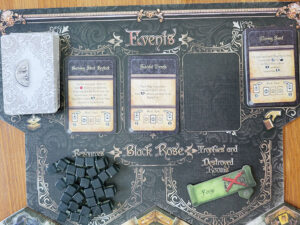
Each round is broken up into 5 phases. First, during the Black Rose Phase, an event is drawn and resolved. The Black Rose will gain power points when events enter play and when they are discarded. Next is the Study Phase, where players draw two cards from their personal grimoire, then four more cards from any School of Magic decks of their choice. Two of those cards will remain in their hand, while the other two are discarded.
The Preparation Phase follows. This is where players program their spells for the round. They will place a spell facedown in each slot they wish to use. These cards must be oriented in the correct direction as each spell card has two spells on it (top and bottom). Once locked in, these cannot be re-ordered or flipped over to the other spell.
The meat of the gameplay takes place during the Action Phase. Here, players will take turns taking actions and playing spell cards. Players can take a physical action (move and activate a room or melee attack and activate a room) and may combine that with another physical action or a spell. They may also play a spell and use a physical action or play another spell as long as they do not play two standard spells in one turn. Quick spells can be played on any turn, while standard spells must be played in the order they were programmed. There are a lot more intricacies to spells that I simply cannot cover in this review.
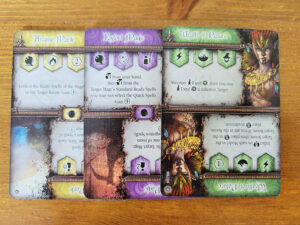
Some important things that will happen mostly during the action phase include completing quests, summoning evocations (creatures/structures under your control), combat and mage defeat, and placing instability in rooms. These are what will net players the most points throughout the game as well as during end game scoring.
Once all players have used all available spells and actions, the Action Phase ends. This is followed by the Evocation Phase, where all players take turns activating their evocations, and finally, the Clean-up Phase, where some scoring takes place, player boards are reset, and unstable rooms are flipped to their inactive side. This phase is also the time to check if any mage or the Black Rose has reached 30 power points, which ends the game.
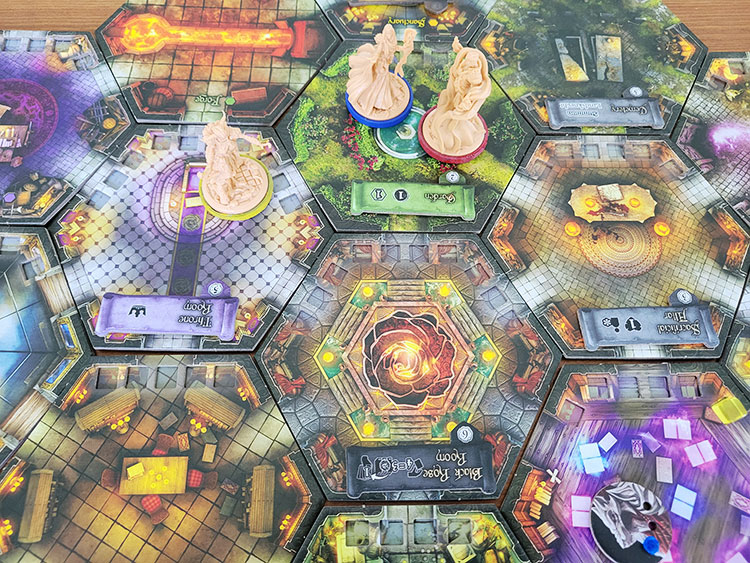
Game Experience:
If you couldn’t tell from the long gameplay overview, there is a ton going on here. I could not go into depth on several mechanics, or else this would be my first 5,000-word review. So, there are a lot of rules, and while the rulebook is pretty solid, there is still a hefty teach and a need for a refresher before each play.
Let’s talk about what I really enjoyed, namely the action phase. This is where the rubber meets the road. Spells are being slung, and punches are being thrown. I believe this game had one goal in mind: action. I love that when I make an attack, 9/10 times, the damage is done in full. It was refreshing to not have to roll a die or draw a card to determine how effective my attack would be. If an attack does get blocked, I know it’s because my opponent was prepared for it. That feels good all around. All of that action is great. As I’ll expand upon later, the excitement from this phase is bogged down by some other aspects of the game.
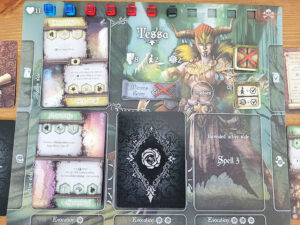
I am a big fan of the system used for damage and defeat, which is reminiscent of Adrenaline. Basically, if you do some damage on a mage who is defeated, you’ll get some points out of it. If you do the most damage, you’ll get more points. If you get the killshot, you’ll get a trophy which will score bonus points at the end of the game. When a mage is defeated, they immediately respawn and are forced to leave their personal cell on their next turn. They can quickly re-enter the fray and get their revenge or find another target to beat upon.
Another element I had fun with is the room activation. It felt like there was a bunch of strategy in picking which rooms you will go to each round to use its unique power and also block others from using it. Some rounds, there was a race to get to one room, and of course, that meant more battles along the way.
You will feel fully engrossed by the game during the action phase, but somehow, you’ll still miss important bits of upkeep and strategic nuances because there’s just so much going on. Events are one thing that’s easily identifiable as fluff. It’s so in the background, but requires some upkeep and can lead to more points. However, during the Black Rose phase and the action phase, they slow the game down more than the payoff is worth. In fact, so much of the time spent outside of the action phase feels wasted. Furthermore, I don’t feel like tracking points for the Black Rose added anything to the game experience except more playtime. All of these things detracted from a strong core of casting crazy spells and striking down your opponents.
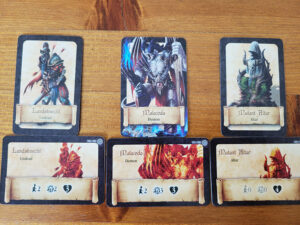
Onto the spells. You have six schools of magic to choose from in the base box; all with their own unique focus. To get a grasp of what each one specializes in, you’ll want to read through about 15 pages of the included Codex Arcanum. All of the spells you draw will feel amazing, making it difficult to decide which to discard. That means more downtime during the study phase as players make tough decisions. Keep in mind, each spell card has two spells on it, meaning players are deciding between 8 spells each study phase while having to take into account the cards they’ve already drawn from their deck. With all the information overload going on here, I would say that’s a good thing. The deckbuilding in itself is hardly deckbuilding as you would be lucky to cycle through your deck once before the game ends unless you take on a strategy that specifically draws from your deck often.
As you may have gleaned, the game is a little slow and overlong. Downtime is noticeable. The study and preparation phases tend to drag. During the action phase, much of the game state and board state changes from turn to turn, meaning you likely won’t be able to do what you had planned. You’ll need to adjust or even come up with a new plan entirely. When making these plans and executing your turn, there are so many things to keep track of. Certain mechanics, such as events that award points and adding instability to rooms, seem almost impossible to remember to utilize at times.
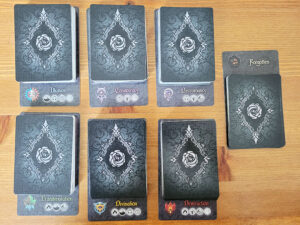
Finally, some notes on production. Iconography is a bit tricky. It took a few games for it to feel “intuitive.” They really should have included another reference card for the symbols. Score tracker tokens are not easy to decipher quickly. I think they should have used colored tokens. There are also no colored bases for the mages. I had to print and paint my own. Lastly, the way to track evocations is just weird. They provide rose pins, which are some of the tiniest components I have ever handled. They are also not very helpful. All of these things make me question how much the game was playtested and how much development work went into it.
With all of the available expansion content, the variety here is a double-edged sword. Sure, it makes the game have seemingly infinite replay value, but it also means that it will take 5 or so games to really start seeing the full potential. That’s assuming you’re playing with the same group over and over again.
Final Thoughts:
Black Rose Wars has lots of good going for it but, ultimately, feels underbaked. What I think will make or break this game for people, is the investment needed. This applies to both learning the ins and outs of the spells, abilities, objectives, etc… but also the time it takes to play each game.
This game rewards rules and memory mastery as much as strategic and tactical mastery. If you want to be a real-life wizard, it will take decades of study and grueling work. This game captures that aspect of the theme masterfully. If you have a group that will play this week after week for months on end, I believe the value is there. It will take several playthroughs of Black Rose Wars to even begin to see that value. For my playstyle, inconsistent player base, and the need to regularly review new games, this does not provide enough enjoyment for the work needed to be put in.
If, down the line, they release a more streamlined version of this game, I’ll be first in line to try it out because there is some magic here.
Final Score: 3 stars – An attack heavy game with cool spells weighed down by too much to keep track of and too much downtime.
 Hits:
Hits:
• Action-packed combat, no punches pulled
• Powerful and fun to use spells
• Endless variety with expansions
Misses:
• Very bloated with a few too many things to track, leads to extensive playtime.
• Odd and sometimes annoying production decisions that affect playability.
• Requires tons of time and brainpower investment for not quite enough payoff.




